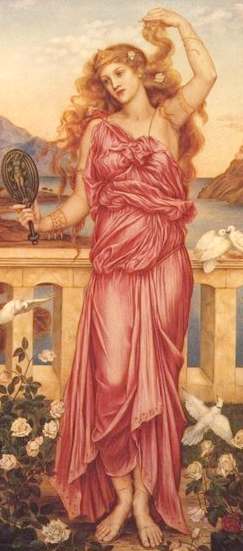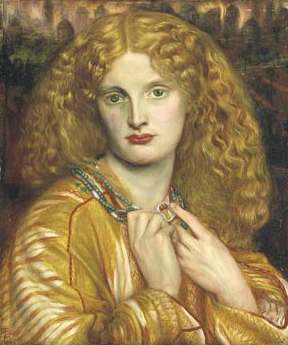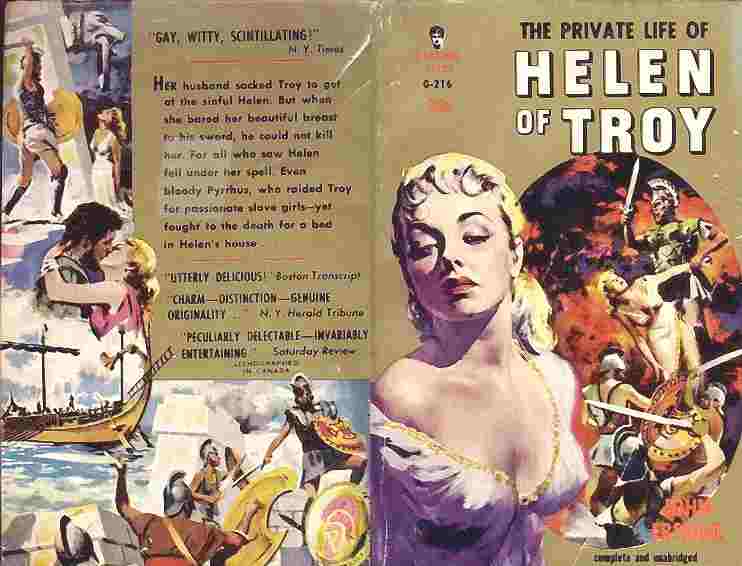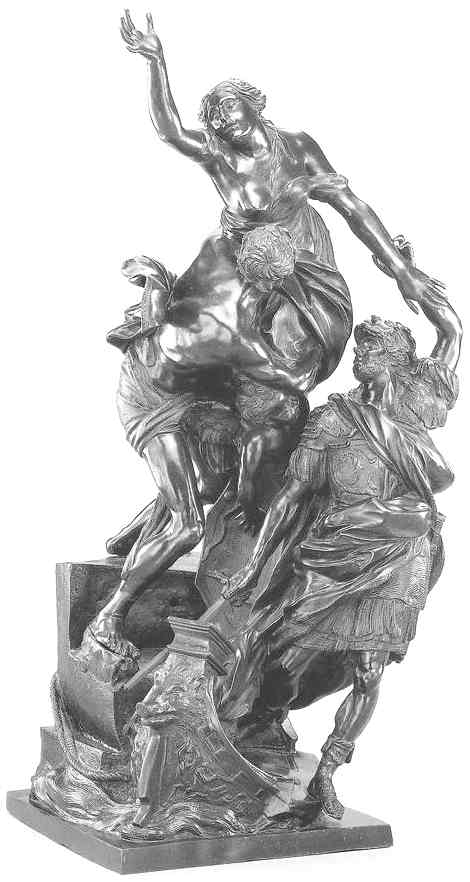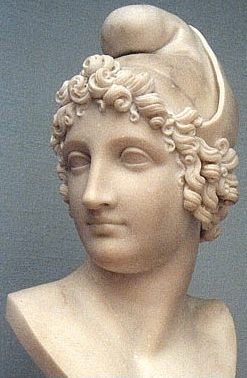|
HELEN OF TROY
|
|
Helen of Sparta was perhaps the most inspiring woman in all literature, ancient and modern. A whole war was fought over her, a war that lasted for ten years and saw one thousand ships launched. Not only that, nearly all the myths of the heroic age were threaded together in such a way that this most epic of all wars was the culmination of various exploits to include: the Argonaut, the Theban wars, and the Calydonian boar hunt. It is as though this event was in the destiny of every dynasty formed from the beginning of recorded history.
Helen (Greek Ελένη) was a figure from Greek mythology. The name is maybe related to the Moon (Selene) and the Sun (Helios). Helene in Greek meant 'torch' and 'corposant'. She was the wife of Menelaus and reputed to be the most beautiful woman in the world, and her abduction by Paris brought about the Trojan War.
Helen was believed to be initially the chief mother-goddess worshipped through the area, until the arrival of the Dodecatheon. Then, she was replaced by Zeus, and her role was demoted and 'survived' through mythology only to the most beautiful woman of the world.
According then to later Greek mythology, Leda bore Helen and Polydeuces, children of Zeus while at the same time bearing Castor and Clytemnestra, children of her father and husband Tyndareus, the King of Sparta. In some versions, Helen is a daughter of Nemesis, the goddess of vengeance.
As the story goes, Zeus cohabited with Leda in the form of a swan on the same night as her husband, King Tyndareus. To the former she gave birth to Helen and Polydeuces, and to the latter, Clytemnestra and Castor. In some versions she laid two eggs from which the children hatched.
Helen of Troy
Two Athenians, Theseus and Pirithous, pledged to marry daughters of Zeus. Theseus chose Helen. He and Pirithous kidnapped her and decided to hold onto her until she was old enough to marry. Pirithous chose Persephone. They left Helen with Theseus' mother, Aethra and travelled to the underworld, domain of Persephone and her husband, Hades. Hades pretended to offer them hospitality and set a feast; as soon as the pair sat down, snakes coiled around their feet and held them there.
When it was time for Helen to marry, many Greek kings and princes came to seek her hand or sent emissaries to do so on their behalf. Among the contenders were Odysseus, Menestheus, Ajax the Great, Patroclus and Idomeneus, but the favourite was Menelaus who did not come in person but was represented by his brother Agamemnon, both of whom were in exile, having fled Thyestes. All but Odysseus brought many and rich gifts with them.
Tyndareus would accept none of the gifts, nor would he send any of the suitors away for fear of offending them and giving grounds for a quarrel. Odysseus promised to solve the problem in a satisfactory manner if Tyndareus would support him in his courting of Penelope, the daughter of Icarius. Tyndareus readily agreed and Odysseus proposed that, before the decision was made, all the suitors should swear a most solemn oath to defend the chosen husband against whoever should quarrel with him. This stratagem succeeded and Helen and Menelaus were married. Following Tyndareus' death, Menelaus became king of Sparta because the only male heirs, Castor and Polydeuces, had died and ascended to Mt. Olympus.
Some years later, Paris, a Trojan prince came to Sparta to marry Helen, whom he had been promised by Aphrodite after he had chosen her as the most beautiful of the goddesses, earning the wrath of Athena and Hera. Helen fell in love with him, as the goddess had promised, willingly leaving behind Menelaus and Hermione, their nine-year-old daughter, to be with her new love.
When he discovered that his wife was missing, Menelaus called upon all the other suitors to fulfill their oaths, thus beginning the Trojan War. Virtually all of Greece took part, either attacking Troy with Menelaus or defending it from them.
This is why Helen was often known as "the face that launched a thousand ships". Note that the idea of Helen's face launching a thousand ships is postclassical - it comes from Christopher Marlowe's The Tragical History of Doctor Faustus, in which Helen makes a cameo, but well-remembered, appearance.
"Is this the face that launched a thousand ships and burned the topless towers of Ilium?" Helen's relationship with Paris varies depending on the source of the story. In some, she loved him dearly (perhaps caused by Aphrodite, who had promised her to Paris). In others, she was a cruel, selfish woman who brought disaster to everyone around her, and she hated him. One version, used by Euripides in his play Helen claims Hermes fashioned a likeness of her out of clouds at Zeus's request, and Helen never even went to Troy, having spent the entire war in Egypt.
When Paris died in the war, his brother, Deiphobus, married Helen. Deiphobus was killed by Menelaus in the sack of Troy. Menelaus had demanded that only he should slay his faithless wife; but, when he raised his sword to do so, the sight of her beauty caused him to let the sword drop from his hand. Instead, he led her in safety to the Greek ships. Helen returned to Sparta with Menelaus. After Menelaus' death, Helen was exiled by their son, Megapenthes. According to another version, use by Euripides in his Orestes, Helen had long ago left the mortal world by then, having been taken up to Olympus almost immediately after Menelaus's return.
Brad Pitt as Achilles in the epic film TROY
Helen, the face that launched a thousand ships, was a tantalizing enigma from the very first. She was flesh and blood certainly, but she was also immortal, since her father was none other than Zeus. Her mother was the beautiful Leda, queen of Sparta, who was ravished by the father of the gods in the form of a swan. Leda's husband was Tyndarecus, who later the same night, unaware of his feathered predecessor, also impregnated his wife. She produced two eggs, one of which yielded Helen and Polydeuces and the other of which contained Castor and Clytemnestra.
While a swan's egg can be accepted for the sake of myth, it has never made much sense that the part of her pregnancy initiated by Tyndareus should produce an egg as well. This most curious of births has been subjected to all manner of combinations over the years. As delicious as the story of Leda was, some commentators even went so far as to suggest that Helen and the Dioscuri were conceived at Rhamnus in Attica by Zeus and Nemesis, the usually rather stern and sexless goddess whose job it was to curb excesses. Nemesis, not happy with being raped by a swan, laid an egg and left it. Leda found it, and when the egg hatched it produced Helen and the Dioscuri. In that case, Clytemnestra was not even a sister of Helen.
It is difficult to imagine the childhood of the famous egg-born quartet. Two of them could be injured, perhaps, but not fatally; two had special gifts that made them physically and mentally superior. Apparently there was no jealousy among them. Castor and Polydeuces were so closely attached they swore to die together, even if Polydeuces could not hope to fulfill this resolve. The relationship between Helen and Clytemnestra was not so simple. Helen was stunningly beautiful, and this must have caused Clytemnestra some wistful moments when inevitable comparisons were made.
When the sisters reached puberty, Helen was kidnapped. Both the aging Theseus, king of Athens, and his friend Peirithous, king of Larissa, wanted to have sex with one of Zeus' daughters before they died. Theseus chose Helen, whose remarkable beauty was already talked of far and wide. The abductors took her to Aphidna, a small city north of Athens, and left her in the safekeeping of one of Theseus' vassals. He put his mother, Aethra, with her as a guardian and companion. Inevitably, stories arose that Theseus took her into safekeeping to do Tyndarcus a favor. One of Tyndarcus' nephews was persistently pursuing her as a suitor, even at her very young age. Another story said the sons of Apharcus, Idas and Lynceus, stole her, which caused the famous fatal battle between them and the Dioscuri. There can be little question that Theseus took Helenís virginity. After all, that was the object of the kidnapping. Some suppose that he planned to keep her intact until she reached marriageable age. But the more realistic writers even gave the couple a child. Interestingly, but improbably, the child was Iphigeneia.
Helen of Troy movie poster
We cannot know how long Helen was at Aphidna. Theseus had accomplished his goal, so he left her and went with Peirithous to Hades to steal Persephone. This was foolhardy as it turned out, for both were imprisoned, Peirithous forever. The Dioscuri meanwhile raised an army and marched on Athens. The Athenians knew nothing of the outrage to their sister, but one Academus had knowledge of the facts and revealed the hiding place. The brothers razed Aphidna and delivered Helen, whom they carried home to Sparta, along with Aethra and Peirithous' sister as personal slaves to their sister.
Clytemnestra married during this time, first to Tantalus, son of Thyestes, and later to Agamemnon, who killed Tantalus. If Helen did bring a baby back from Aphidna, it made good sense for Clytemnestra to adopt it, since Helen was still considered a virgin. If the child was Iphigeneia, some of the drama of sacrifice at Aulis would be diminished, and Clytemnestra's revenge motive would not be as strong. It is probably best to go with the common story that Helen had no child by Theseus and that Iphigeneia was the daughter of Agamemnon and Clytemnestra.
Upon Helen's return to Sparta, an avalanche of suitors started to arrive. It would be interesting to explore the dynamics of this mass courting. Every red-blooded male in Greece who had heard of the gorgeous Helen dreamed of possessing her. But acting on such ambition had a price tag. One had to be able to afford an impressive appearance, complete with attendants, gifts, and other evidence of affluency. It must be pointed out that the suitors were really wooing Tyndarcus, not Helen. Their expense was nothing to what the process cost the father. The suitors and their attendants had to be lodged and entertained, and the laws of hospitality probably did not allow for limits on the duration of one's stay.
The roll call of suitors shows that they came from all parts of Greece and represented the finest stock of heroes and heirs to property and wealth. They were Odysseus, son of Laertes; Diomedes, son of Tydeus; Antilochus, son of Nestor; Agapenor, son of Ancaeus; Sthenelus, son of Capaneus; Amphimachus, son of Cteatus; Thalpius, son of Eurytus; Meges, son of Phyleus; Amphilochus, son of Amphiaraus; Menestheus, son of Peteos; Schedius and Epistrophus, sons of Iphitus; Polyxenus, son of Agasthenes; Peneleus, son of Hippalcimus; Leitus, son of Alector; Ajax, son of Oileus; Ascalaphus and Ialmenus, sons of Ares; Elephenor, son of Chalcodon; Eumelus, son of Admetus; Polypoetes, son of Peirithous; Leonteus, son of Coronus; Podaleirius and Machaon, sons of Asclepius; Philoctetes, son of Poeas; Eurypylus, son of Euaemon; Protesilaus and Podarces, sons of Iphiclus; Menelaus, son of Pleisthenes (or Atreus); Ajax and Teucer, sons of Telamon; Patroclus, son of Menoetius; and Idomeneus, son of Deucalion. There were other lists, of course, with considerable variation in the names. In later years it was probably socially advantageous for one to be able to claim an ancestor who had been one of Helenís suitors, in much the way descendants of the Argonauts could probably have filled three ships with their ancestors.
It is interesting to learn that some of the suitors did not appear in person but sent representatives with offers of handsome dowries. Ajax the Greater promised considerable property, some of it not his own but to be acquired if he was chosen. Odysseus took no gifts, not expecting to win. Idomeneus of Crete appeared in person, depending on his extraordinary good looks to overcome the competition. Tyndareus was at a loss as to how to proceed, because he feared reprisal from the unsuccessful. Happy to settle for Tyndareus' niece, the wily Odysseus offered a solution in exchange for Penelope, a match Tyndareus was able to arrange with his brother Icarius. Odysseus suggested that each suitor swear an oath to stand behind whomever Tyndarcus selected and be ready at any time in the future to defend the favored bridegroom against any wrong done to him in respect to the marriage. Everyone agreed to these terms, and Tyndareus promptly chose Menelaus, whom he had probably had in mind all along.
Helen of Troy - painting by Dante Rossetti
It may be important to realize that Helen really had little say-so in this arrangement. Menelaus was a political choice on her father's part. He had wealth and power, mainly through his brother Agamemnon, but for Helen he did not offer the good looks and glamor of some of her other suitors. It was her lot to grace the palace and the kingdom Menelaus soon inherited. She gave birth to Hermione, Aethiolas, Maraphius, and Pleisthenes, and, according to some, Nicostratus, although many claimed he and Megapenthes were the sons of Menelaus by Pieris, a slave. In that case, we can took at an additional reason for her own infidelity: (She had no way of knowing about another amorous adventure Menelaus was having in Crete during the time he was attending his grandfather's funeral.)
According to some writers, Sparta experienced a plague during the early years of their marriage, and Menelaus was advised by an oracle to go to Troy to observe propitiatory rites at the graves of Lycus and Chimaereus, sons of Prometheus, who were buried there. Menelaus did so and was accompanied on his return by Paris, who had accidentally killed his best friend in an athletic contest and needed purification. The two arrived in Sparta, and during the several days necessary for the purification ceremony, Paris had many opportunities to see the gorgeous woman who had been promised to him. About the time the absolution was completed, Menelaus had to leave unexpectedly for Crete to attend funeral ceremonies for his grandfather Catreus. Ingenuously he left the handsome visitor to be entertained by his wife. Helen had been utterly charmed by the stranger. He was by nature already handsome, but Aphrodite, as if to guarantee the success of her project, had made him even more irresistibly beautiful. In addition, he possessed manners and charm, and it was impossible for Helen not to fall in love with this superb young man. He, of course, had fallen under her spell the instant he laid eyes on her.
Menelaus had not been gone long before the lovers departed. Some say they left the very next night, but some preparation must have been necessary. Paris had his own ship, and certainly he had retainers with him befitting his royal status. Helen required her own attendants, who included Aethra, the mother of Theseus; Thisadie, sister of Peirithous; and Astyanassa, Clymene, and Electra, servants. According to some reports, Paris helped himself to the royal treasury. It does not speak too well for Menelaus' authority that his security forces would have allowed this flagrant plundering. He must have left a considerable army behind when he went to Crete. It is likely Helen had a sufficiently large number of loyal subjects that she could come and go without question. Undoubtedly many of the palace guards were secretly in love with her.
Helen of Troy - played by Diane Kruger in TROY the movie
Inevitably there were the stories that sought to make Helen look sinned against rather than sinning. According to these, she was taken by force. One silly version even suggested that Aphrodite deceived her by giving Paris the appearance of Menelaus. It was Aphrodite herself, though, who had pronounced a curse on Tyndarcus that his daughters Clytemnestra, Timandra, and Helen would be adulteresses, and she probably did not allow for such an excuse as involuntary adultery.
At Gythium, the port of Sparta, they embarked after Paris dedicated a sanctuary to Aphrodite Migonitis in appreciation for her assistance. They were barely under way before they stopped at the island of Cranae, still within view of Gythium. So far the couple had not been to bed together, even though there was ample opportunity after Menelaus left. Perhaps Paris felt comfortable in robbing the treasury of his host but not further violating the code of hospitality by sleeping with his wife in his own house. For some similar moral reason, Helen may have held him off until they had left the mainland. Or maybe it made good sense to erect the sanctuary at Gythium to Aphrodite, who might otherwise give them trouble at a later time. Paris could have had in mind to make for Onugnathus, farther down the Laconian Gulf and more or less out of immediate range of any pursuers, but biological urgencies probably forced him to cast anchor immediately. The consummation stuns the imagination. What a sublime moment for Paris, who now lay with the most desired woman in the entire world. Undoubtedly his passion was heightened by Aphrodite, who must have considered this her most inspired achievement.
As for Helen, there could have been a bittersweet response to the great moment. Until then she had experienced sex with only the aging Theseus and the prosaic Menelaus. This virile young man must have given her bliss she had not imagined, but certainly the shadow of her infidelity and the abandonment of her children must have cast itself across the love couch. The trip thereafter has been variously described. The temptation to embroider on the already rich tapestry was too strong to resist. The ship went to Egypt and Phoenicia. According to one account, Proteus, king in Egypt, took Helen from Paris and gave him a phantom image of her, restoring the real Helen to Menelaus on his return from Troy. This inane account would then make the Trojan War a total mockery. Another similarly tiresome account had Paris robbing the king of Sidon, who had offered the party hospitality on their way up the coast. Already disgraced in most eyes, Paris would then have been little more than a pirate.
Whatever minor adventures befell them, the company came at last to Troy. The Trojans, even those who had criticized the rashness of Priamís son, could only marvel at the divine beauty who stepped off the ship. A wedding ceremony took place, and it was as though Helen was marrying Troy, since her destiny became at that moment interlocked with the destiny of the city. Even Priam was fully won over and vowed to protect her as long as she wanted to remain.
Helen of Troy - movie by Max Steiner
The lovers had barely left Sparta before couriers were running swiftly to all parts of Greece. The unthinkable had happened. Menelaus came swiftly back from Crete, where his loitering with a nymph had allowed the elopers ample time to outdistance any possible pursuit. Agamemnon was furious. Not only was his family dishonored, but he took the insult almost personally. One suspects he himself was in love with his sister-in-law. Swift action was taken. Menelaus, Odysseus, and, according to some, Acamas, the son of Theseus, went to Troy to demand that Helen be returned. Incidentally, this above all would seem to silence the versions that had Paris and Helen taking months to reach Troy. Though counseled by such advisers as Antenor and Aeneas to surrender Helen, Priam stubbornly held to his promise to her. Moreover, he recalled the reverse situation when his sister Hesione had been kidnapped by Heracles and Telamon, and the Greeks had turned deaf ears to entreaties for her return.
The envoys returned to Greece, and preparations for war began. The former suitors of Helen were reminded of the oath they had sworn. Armies were recruited and ships were built. Men who had been boys when Helen married came forward to enlist in a cause that the gods transported her to Elysium. This was the most fitting end of the story since Helen was, after all, immortal. Consequently, Menelaus could scarcely have carried out his intention of killing her when he was reunited with her at Troy. Immortal or not, her physical remains and those of Menelaus were supposed to be buried at Therapne in a temple dedicated to them. Writers even followed her into the afterworld, where they had her marry Achilles, making him her fifth husband, following Theseus, Menelaus, Paris, and Deiphobus. From there she was even said to have blinded the poet Stesichorus for writing unflattering things about her; she restored his vision when he recanted and composed a poem in her praise.
The most fascinating thing about Helen was her story. It was far better than she was. We do not see any real character development in her and have to regard her as a pawn of the gods. The larger story is involved with the people around her, their rise and fall. She herself seemed almost oblivious to the horrors that surrounded her. She displayed very little emotion and no remorse. She seemed removed and largely unaffected by the outcome of the war. In most accounts of her final years she was not even made to pay for her part in the calamity that touched virtually every family in Greece. It is small wonder some writers contrived alternative versions in which she was made to pay a debt to society.
Homer. Iliad; Homer. Odyssey; Euripides. Electra; Apollodorus. Bibliotheke III, x,7-xi, 1; Apollodorus. Epitome II, 15-III, 6; V, 22; VI, 29; Plutarch. Theseus. An estimation of her life based on the traditional dates of the Trojan War:
The Private Life of Helen of Troy - book cover John Erskine 1926
LINKS:
http://www.anzachouse.com/Troy.shtml Our daily tour is as follows :- The tour proceeds to the ancient city of Troy in our air-conditioned 'NO-SMOKING' tour bus. The guide will explain the mythology surrounding Troy, the Trojan Horse and Helen of Troy, as well as explaining the history and discoveries of the...
http://www-personal.umich.edu/~geneh/umichamigos/helen.html Helen of Troy Helen graduates!Who is Helen of Troy? She's quite a special person indeed. Most references and people I know can identify her as being responsible for: The war between the Trojans and the Greeks The downfall of the Greeks The downfall of Troy The birth of the Roman Empire The mass...
http://www.messagenet.com/myths/funfact1/fact03.html She was never called Helen of Troy! Helen is often referred to as Helen of Argos but she was never called Helen of Troy! If you guessed Helen on Wheels... you are my kind of punster. Of course, the answer is wrong in the technical sense but you have a good attitude and that counts for something...
http://www.messagenet.com/myths/funfact1/index.html Fun Fact Quiz 1) Athene is known as: child of the Dawn maiden of Spring the spoiler 2) Achilleus was: a humble and kind man a brutal murderous maniac inside the Trojan Horse 3) Helen was called: Helen of Argos Helen of Troy Helen on Wheels 4) The ancient Greeks called...
http://parowanprophet.com/A_Trojan_Horse/helen_of_troy.htm Helen of Troy, the face that launched a thousand ships Home to Main Page Helen of Troy July 2001 Tribes # 9 There is so much to tell, and if you are new to my site it may seem confusing until you get a little background. But...
http://www.wic.org/artwork/helent.htm WIC - History of Women through Art HELEN OF TROY (Greek - Legendary) Helen - The Puppet of the Gods Although she had few spoken lines, Helen, the most beautiful mortal on earth was frequently manipulated on the comedic and tragic stage of Greek mythology. Daughter of the mortal Leda and fathered by...
http://www.arthistory.sbc.edu/imageswomen/papers/hamiltonhelen/helenoftroy.html Helen of TroybyPatricia Hamilton(Paper submitted to Images of Women in the Ancient World: Issues of Interpretation and Identity, Spring 1998)Helen of Troy is quite possibly one of the most inspired characters of all time, including modern and ancient literature. She has...
http://www.iserv.net/~merriman/helndest.htm Helen of Troy HELLon des'TROY Copyright WILLIAM G. MERRIMAN Helen of Troy was the woman fought over by a prince and a king in an ancient Greek parable. Paris, the son of the king of Troy, abducted Helen, the wife of the king of Sparta, thus...
http://arttoscience.org/sculp3275750.html Sphinx, Helen of Troy, Oedipus, Menelaous, Sculptural Trail The Sculptural Trail The Sphinx (by Barbara Kaufman) is a dangerous woman. She is seductive, powerful and vulnerable. We note a fusion of roles: she is a voluptuous female, a seductress. She is a cat, a lioness, or a...
Helen of Troy - the rape
http://www.parowanprophet.com/A_Trojan_Horse/helen_of_troy.htm Helen of Troy, the face that launched a thousand ships Home to Main Page Helen of Troy July 2001 Tribes # 9 There is so much to tell, and if you are new to my site it may seem confusing until you get a little background. But...
http://www.whitedragon.org.uk/articles/troy.htm Dragon's Hoard - Helen of Troy Helen of Troy - Heroine or Goddess? By Karen Pierce Originally Published Imbolc 2000 INTRODUCTION In this article I would like to take a look at the Greek mythological heroine Helen of Troy, and try to discern whether there is any evidence to show that she was once... http://www.helenoftroylp.com/ Helen of Troy ...
http://whitedragon.org.uk/articles/troy.htm Dragon's Hoard - Helen of Troy Helen of Troy - Heroine or Goddess? By Karen Pierce Originally Published Imbolc 2000 INTRODUCTION In this article I would like to take a look at the Greek mythological heroine Helen of Troy, and try to discern whether there is any evidence to show that she was once...
http://wynkyn.com/mycenae.htm The Search for Mycenae, King Agamemnon, Helen of Troy, Hercules Twelve (12) Labors, Cyclopean Walls The Search for Mycenae This is the legendary Mycenae in Greece, which dates from around 1,600 BC... The palace was made of stones so huge they were called Cyclopean Walls, in the...
http://www.cougar.net.au/~helward/history/war.html Helen of Troy For more detailed arguments refer to: Donald Kagan, Archidamian War pp.124-146 An excellent discussion on the causes of the revolt. Dennis Proctor,The...
http://www.cougar.net.au/~helward/history/ Helen of Troy Mystery of History HELEN OF TROY MYSTERY OF HISTORY Please click below for arguments on the following topics Roman History and Australian Society sites still under construction Peloponnesian War Roman History Australian...
http://www.hellenism.net/eng/helen.htm Greek Mythology - Ancient greek myths, Helen of Troy HELEN OF TROY There are a couple of different stories about Helen's parents. Her father is Zeus. In one story, he couple with Nemesis in the form of swans. The egg which resulted was...
http://www.andrews.edu/LH/yearly-mission.html Lamson Hall - Yerly Mission Theme Message for 2000-2001 . ........................Closer to the Heart of God Helen of Troy must have been something. Two kingdoms went to war over her...
http://www.jetlink.net/~massij/wssq/allswell.htm Study Questions for Shakespeare's All's Well Study Questions for Shakespeare's All's Well that Ends Well 1. As the play often notes, Helen shares a name with a notorious woman--Helen of Troy. This historical namesake has an ambiguous reputation in Shakespeare's day: on the one hand, she is a...
http://home.swipnet.se/~w-48250/mythology/h/helen.html Helen Helen Helen (often called Helen of Troy) was the daughter of Leda and Zeus, and was the sister of the Dioscuri and Clytemnestra. Since Zeus visited Leda in the form of a swan, Helen was often presented as being born from an egg. She was reputed to be the most beautiful woman in the world... http://www.eonline.com/Facts/Movies/0,60,44182,00.html E! Online - Movie Facts - Helen of Troy (1955) Feb. 19, 2002...
http://www.messagenet.com/myths/funfact1/fact03.html Fun Fact Answer #3 She was never called Helen of Troy! Helen is often referred to as Helen of Argos but she was never called Helen of Troy! If you guessed Helen on Wheels... you are my kind of punster. Of course, the answer is wrong in the technical sense but you have a good attitude and that...
http://www.arttoscience.org/sculptures/275750.htm Sphinx, Helen of Troy, Oedipus, Menelaous, Sculptural Trail The Sculptural Trail The Sphinx (by Barbara Kaufman) is a dangerous woman. She is seductive, powerful and vulnerable. We note a fusion of roles: she is a voluptuous female, a seductress. She is a cat...
http://wyoskies.uwyo.edu/wysky/sOct01.html saug99 October 2001 Interest October Star myths The constellation Cygnus the Swan is the centerpiece for October's celestial story telling. In Roman mythology Zeus (Jupiter) used the disguise of a swan to lure the beautiful Leda, and he fathered Pollux and Helen of Troy, the most...
http://pc59te.dte.uma.es/cdb/series/image/helen.htm Helen HELEN OF TROY Name: Helen Group: Queen of Sparta. Origin: Sparta, the Aegean First appearance: A thousand ships #2 Known Relatives: Menelaus (husband) Tyndareus (father) Kastor and Polydeukes (brothers) Hermione (daughter) Nokostrato (son...
Bust of Helen by Antonio Canova 1807 (Paris)
http://www.nmaa.si.edu/t2go/1ya/1969.33.html Treasures to Go 53 of 54 Benjamin West Helen Brought to Paris 1776 oil 56 1/2 x 75 3/8 in. Smithsonian American Art Museum Venus floats in on a cloud and gently urges Helen of Troy#151the #147face that launched a thousand ships#148#151toward an expectant Paris, who sits...
http://www.messagenet.com/myths/funfact1/ Fun Fact Quiz Fun Fact Quiz 1) Athene is known as: child of the Dawn maiden of Spring the spoiler 2) Achilleus was: a humble and kind man a brutal murderous maniac inside the Trojan Horse 3) Helen was called: Helen of Argos Helen of Troy Helen on Wheels 4) The ancient...
http://www.mythweb.com/heroes/theseus/theseus21.html Theseus And so, in the fullness of time, when Theseus decided to carry off young Helen of Sparta, Peirithous agreed to lend a hand. This was the same Helen whose face would launch a thousand ships when, as Helen of Troy, the lover and captive of the Trojan Paris, she caused the allies of her...
http://www.dcs.gla.ac.uk/~lsv/aboutstlucia.html Some information on my homeland, St. Lucia St. Lucia has been referred to as the 'Helen of the West Indies' after the Greek's 'Helen of Troy'. No doubt, my view is justifiably biased so I have included a few links of some St. Lucia - centric organizations that may make up for my partiality. If you...
http://calilasseia.www2.50megs.com/EDEMHelen.html Helen Of Troy (Date Unavailable)Evelyn de Morgan (1855-1919) Medium : Oil on Canvas Picture Size : Not Currently Available The location of the original canvas is : The de Morgan Foundation, London. Click upon this canvas to return to the Evelyn de Morgan Room Click upon this canvas to return to...
http://www.allensinc.com/plates/pickard/mosthele.htm Pickard - Most Beautiful Women of All Time Series Plates - Helen of Troy Most Beautiful Women of All Time Series Plate by Pickard Helen of Troy Click the Collector Plates button below to check our current inventory. Collector Plates M thru P Allen's Home Page...
Troy - the movie starring Brad Pitt, Eric Bana, Orlando Bloom and Diane Kruger
The Solar Navigator - SWASSH (Small Waterplane Area Stabilized Single Hull) test model 2012 The latest Solarnavigator is a robot ship designed to be capable of an autonomous world navigation set for an attempt in 2015 if all goes according to schedule. The platform is also ideal for persistent monitoring 365 days year 24/7 - with data streamed back to your command HQ via satellite.
|
|
This
website is copyright © 1991- 2013 Electrick Publications. All rights
reserved. The bird logo
|
